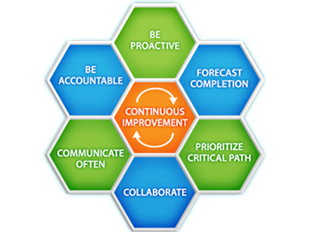What Does it Take to Be Successful?
Some may think it’s luck or genetics but there may be more to what makes successful people actually successful. As we all try to succeed in this busy, ever changing world, the mystery eludes many of us on how we can achieve success in our lives. Many books, blogs and articles have been written about what makes successful people tick. What was found was that a lot of their lives revolve around habits of routine, attitude and determination. Most are simple habits that anyone can take on in their lives without a major overhaul.

Reading
Believe it or not, most successful people are avid readers. Warren Buffett reportedly spends 80% of his day reading. Tech billionaire Elon Musk taught himself how to build rockets through reading.
Successful people are life-long learners. They are constantly educating themselves through books, academics, life experiences and more. The saying is true that knowledge is power when it comes to being successful.
Fitness
It is not only important to exercise the mind but also the body. Successful people know that to perform at their top level they need to be in good shape. Personal finance author Ramit Sethi said that the number one thing that successful people have in common is exercise.
Gratitude and Humility
They are more than willing to admit their mistakes and apologize. They are confident in their ability but not over confident. They give credit where credit is due and acknowledge the work of others. They also show gratitude for those that help them learn and achieve their goals and objectives. A thank you note or email can go a long way when earning the respect of a fellow team member. They also take pleasure in helping others succeed.
A Different Viewpoint
When many people may look at a situation as a problem, successful people look at it as a lesson. They are often solution focused and look for and find opportunities when others may see nothing.
Complaining is considered a waste of time and just puts the situation in a negative and unproductive state. They also do not blame and take responsibility when for their own actions or outcomes.
They choose to align themselves with people with similar viewpoints. Ones who understand the importance of working as part of a team and creating solid relationships.
Communication is key and they work at it every day of their lives.
Balance
Yes, they may have financial success but they realize that is not everything. They have a balance in their lives and have identified their own personal core values and do their best to live a life which is reflective of those values. They also know that their career is not their identity and know when to take the time to relax and enjoy what they have in life.
They also understand the importance of discipline and self control and work to manage their emotions. They understand the importance of working the tough items in life that most people try to avoid.
The Finish Line
While many may begin a multitude of projects, successful people finish what they started. They typically look for the best way that provides the best results over the long term vs the easiest solution. They set high standards for themselves which in turn usually produces greater commitment, work ethic, momentum and results.
Procrastination is not a word in their vocabulary. They don’t believe in fate or destiny to shape their future. They rely on their on work and often try to be proactive vs reactive.
Most of all, they practice what they preach. They live this reality of constantly learning, respecting themselves mind, body and soul, looking to ways to accomplish goals in their life and never giving up.
What daily habits do you have that impact your success every day?
Winning with Purpose
I relish competition! Maybe it is because I grew up playing sports and learning that I enjoyed competing and winning way more than losing. Maybe it is because winning, in the competitive arena, demands your very best. Maybe it’s because winning in business normally requires a team effort, and I like working in a team setting. Whatever it is, competition is something I have always loved. But winning, achievement, and reaching a certain level of success can be hollow without purpose. After 30+ years of competing each and every day, I have come to the conclusion that winning is really fun, but sharing the spoils of winning creates fulfillment and purpose.
I also believe that the juices that start to flow in the midst of a competitive battle can be the same juices that ignite a compassionate responsibility for those in our community. What I have learned over the years is that capitalism and compassion can co-exist and that — gasp! — business can be a force for good.
How Can Business Be a Force for Good?
 I personally know a great many smart and good-hearted business leaders in the Colorado community. Some of the very best people I know are CEOs, business owners, and entrepreneurs. They care about their employees and the people in their communities a great deal. Most of these business leaders are willing (and wanting) to engage in helping others, but there are so many daunting questions:
I personally know a great many smart and good-hearted business leaders in the Colorado community. Some of the very best people I know are CEOs, business owners, and entrepreneurs. They care about their employees and the people in their communities a great deal. Most of these business leaders are willing (and wanting) to engage in helping others, but there are so many daunting questions:
- What organization should we support?
- How can my employees get involved?
- How much time will this require?
- Will our involvement send the wrong signal to my employees, shareholders, customers, or partners?
These are common questions that can stop us from taking action.
Getting Companies Involved
For nearly 10 years, my company has been actively involved with Habitat for Humanity of Metro Denver. Zunesis employees have worked diligently to build homes for hard working families in the Denver community. Each year we do a build day where we all put on hard hats and work together to help construct the home we are sponsoring that year – “the Zunesis home.”
 This engagement has served as a very practical way for my small business to give back and support our neighbors in our own community. We even get to work side-by-side with families who will be moving into the home when completed. Seeing the lives of hard working families in our community completely changed by having a secure, safe, and stable place that they call home is something that never loses its luster or excitement.
This engagement has served as a very practical way for my small business to give back and support our neighbors in our own community. We even get to work side-by-side with families who will be moving into the home when completed. Seeing the lives of hard working families in our community completely changed by having a secure, safe, and stable place that they call home is something that never loses its luster or excitement.
Being part of something that transcends success in business and tangibly blesses people in our community has been good for my employees and our business. I’m guessing that many business leaders and CEOs also want to get involved in supporting their communities, but they may not know how to get started. I learned that a great place to start is to ask your employees. It is likely that you will find some great ideas and maybe some passion that can be leveraged to get the ball rolling.
I would also encourage you to talk with other CEOs and business leaders about what they are doing. There are so many great ways to give back, and most organizations have a method and a process for you to get engaged. If you want to know about how to get engaged with Habitat for Humanity, I would be happy to share my personal experience and get you connected to the right people. Wouldn’t it be wonderful if Colorado became the place where Capitalism and Compassion freely found common ground?
It’s a frustrating routine: I fall sound asleep at about 10:30 only to wake up a few hours later with my mind racing. This, of course, causes a myriad of after-effects, not the least of which is a very crabby morning-after. So, at the urging of my husband, my New Year’s resolution for 2017 is simple: This year, I resolve to sleep through the night.
In trolling the self-help blogs, a recurring message was that an anecdote to middle-of-the-night worrying is simply being confident that you are in control of all the things that need to be done the next day. Although I’m an avid planner, I have days where I don’t make much of dent in my list. Knowing that, I focused on time management and found five strategies to adopt:
1. Have one “must-achieve” goal every day.
Start each morning with one “must-achieve goal.” More than likely, this is the one thing that will wake you up in the middle of night. If you know that it is the one thing you’re absolutely, no matter what, getting done tomorrow, you don’t need to stress about it tonight.
2. Fight the tyranny of the urgent.
 If you succumb to the tyranny of the urgent, you can find yourself going days, or even weeks, without touching the important stuff. Don’t be afraid to ignore or delegate the things that get in the way of real forward momentum.
If you succumb to the tyranny of the urgent, you can find yourself going days, or even weeks, without touching the important stuff. Don’t be afraid to ignore or delegate the things that get in the way of real forward momentum.
3. Never touch things twice.
Don’t save an email or a phone call to deal with later. As soon as something gets your attention you should act on it, delegate it, or delete it.
4. Eat a frog.
Do the least appetizing, most dreaded item on your to-do list before you do anything else. This not only gets the nasty task out of the way, but it also gives you a sense of success, boosting further productivity.
5. Get ready for tomorrow before leaving the office.
This practice accomplishes two things: it helps you solidify what you’ve accomplished today, and it ensures you’ll have a productive tomorrow.
Happy New Year, and here’s to sleeping through the night in 2017!
It’s a frustrating routine: I fall sound asleep at about 10:30 only to wake up a few hours later with my mind racing. This, of course, causes a myriad of after-effects, not the least of which is a very crabby morning-after. So, at the urging of my husband, my New Year’s resolution for 2017 is simple: This year, I resolve to sleep through the night.
In trolling the self-help blogs, a recurring message was that an anecdote to middle-of-the-night worrying is simply being confident that you are in control of all the things that need to be done the next day. Although I’m an avid planner, I have days where I don’t make much of dent in my list. Knowing that, I focused on time management and found five strategies to adopt:
1. Have one “must-achieve” goal every day.
Start each morning with one “must-achieve goal.” More than likely, this is the one thing that will wake you up in the middle of night. If you know that it is the one thing you’re absolutely, no matter what, getting done tomorrow, you don’t need to stress about it tonight.
2. Fight the tyranny of the urgent.
 If you succumb to the tyranny of the urgent, you can find yourself going days, or even weeks, without touching the important stuff. Don’t be afraid to ignore or delegate the things that get in the way of real forward momentum.
If you succumb to the tyranny of the urgent, you can find yourself going days, or even weeks, without touching the important stuff. Don’t be afraid to ignore or delegate the things that get in the way of real forward momentum.
3. Never touch things twice.
Don’t save an email or a phone call to deal with later. As soon as something gets your attention you should act on it, delegate it, or delete it.
4. Eat a frog.
Do the least appetizing, most dreaded item on your to-do list before you do anything else. This not only gets the nasty task out of the way, but it also gives you a sense of success, boosting further productivity.
5. Get ready for tomorrow before leaving the office.
This practice accomplishes two things: it helps you solidify what you’ve accomplished today, and it ensures you’ll have a productive tomorrow.
Happy New Year, and here’s to sleeping through the night in 2017!

